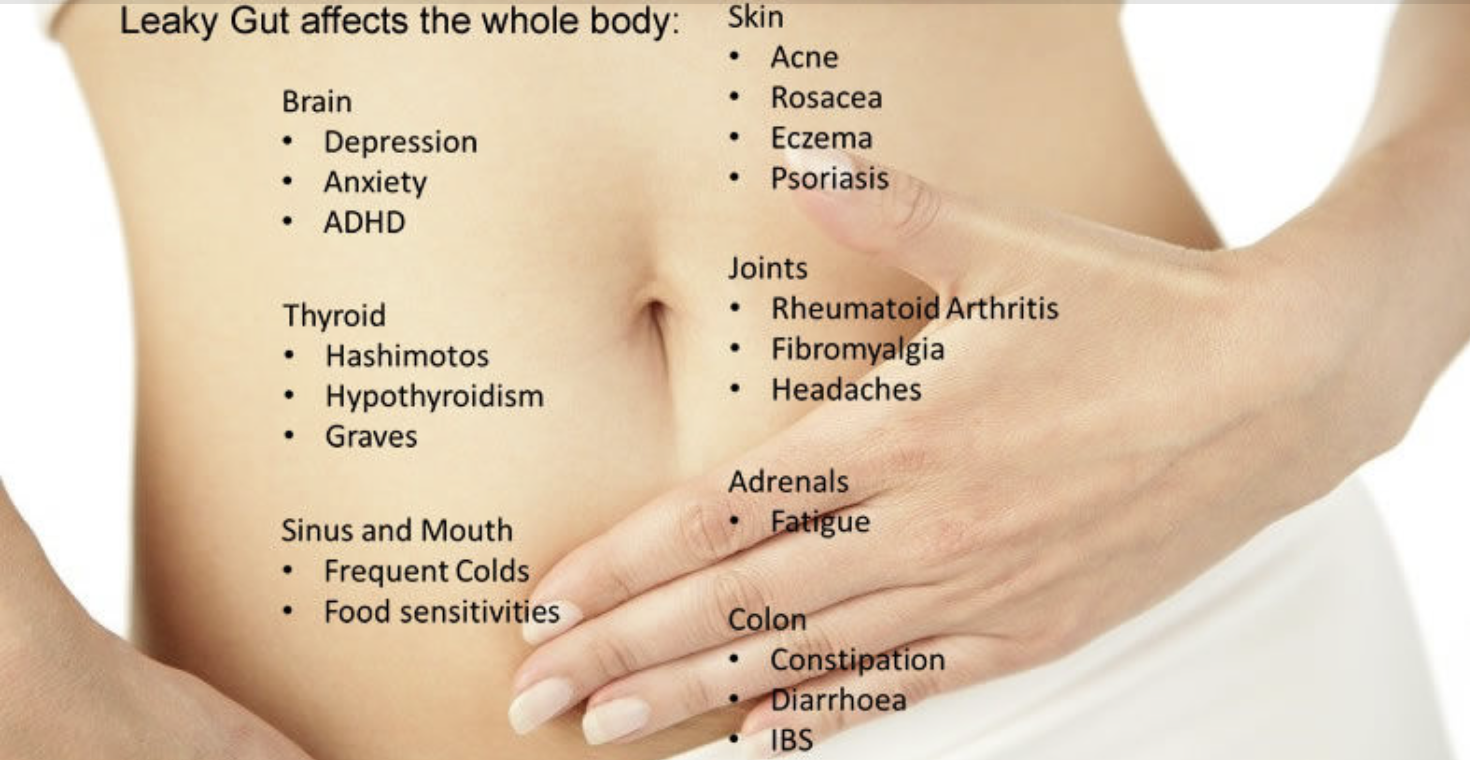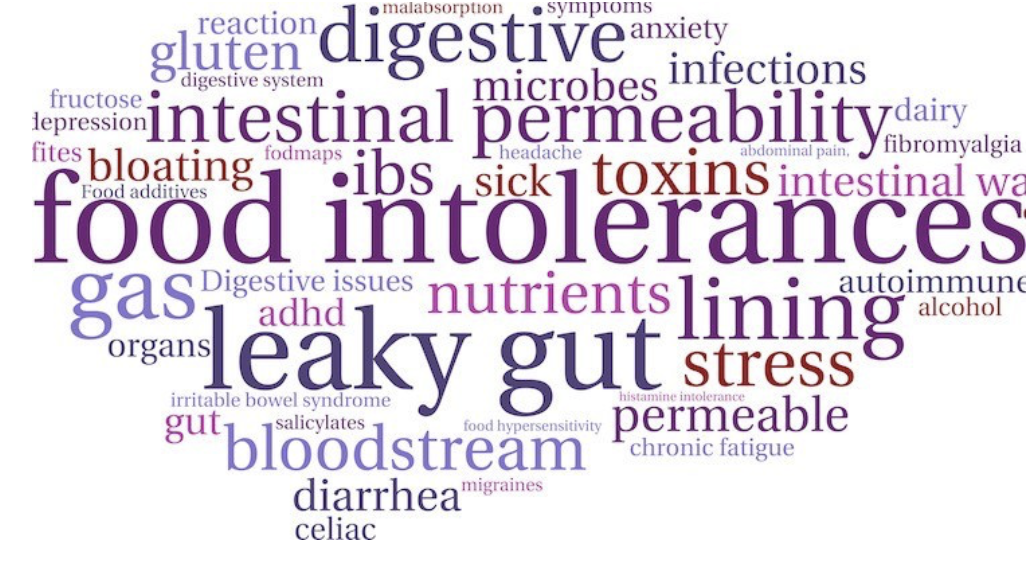Leaky gut occurs when there is damage to the intestinal tract making it more permeable to substances that should not cross the delicate lining.
The intestines, which are a part of your digestive tract, are lined with a mucus-like intestinal barrier. It’s sort of like a screen or a net with lots of tiny holes all over it. These holes serve as protection, allowing only certain substances to pass through. Bigger, unwanted particles are kept out.
When you experience Leaky Gut Syndrome – also called Increased Intestinal Permeability – the holes in your net grow bigger.
This is a serious condition because all of the particles the net is meant to filter away are now able to pass through where they shouldn’t.
When the net weakens or becomes damaged, things like viruses or undigested food, waste, and gut bacteria (bad bacteria) can literally leak from inside your intestines, through the net, and into your bloodstream. This can end up causing strange reactions that feel like they’re coming out of the blue, including headaches, rashes, bloating, fatigue, food allergies, and inflammation.
The intestines, which are a part of your digestive tract, are lined with a mucus-like intestinal barrier. It’s sort of like a screen or a net with lots of tiny holes all over it. These holes serve as protection, allowing only certain substances to pass through. Bigger, unwanted particles are kept out.
When you experience Leaky Gut Syndrome – also called Increased Intestinal Permeability – the holes in your net grow bigger.
This is a serious condition because all of the particles the net is meant to filter away are now able to pass through where they shouldn’t.
When the net weakens or becomes damaged, things like viruses or undigested food, waste, and gut bacteria (bad bacteria) can literally leak from inside your intestines, through the net, and into your bloodstream. This can end up causing strange reactions that feel like they’re coming out of the blue, including headaches, rashes, bloating, fatigue, food allergies, and inflammation.
|
Leaky gut may present as:
'Leaky brain' may present as: A recent study now shows that increased levels of zonulin, from a leaky gut, may in fact not just present as a digestive symptoms or those conditions listed above. They may also affect the gate keepers of the brain endothelial cell barriers, allowing toxic compounds to cross the blood brain barrier. 70% of your serotonin is made in your gut.
|
The Leaky Gut and Autoimmune Connection:
When your gut is leaky and more and more particles are able to escape into your bloodstream, your immune system reacts by sending out wave after wave of inflammation to attack the foreign invaders. This state of high alert causes your immune system to become overstressed and fire less accurately, sometimes leading your own tissues to get caught in the crosshairs. Eventually, this will develop into full-blown autoimmunity if your gut is not repaired. In addition, your immune system starts making antibodies against the substances that have escaped into your bloodstream. Many of these foreign invaders - gluten and dairy in particular— look very similar to your own body’s cells, causing your immune system to get confused and accidentally attack your tissues. This process of mistaken identity is called molecular mimicry. It’s another way that leaky gut can trigger autoimmune disease. We know from the research that leaky gut is a necessary precondition for developing an autoimmune disease. And, once you have an autoimmune disease, leaving your leaky gut untreated can cause your condition to progress. This places you at higher risk of developing another autoimmune disease. |
The very first place everyone should begin is by following the '4R' approach:
- Remove. Remove all inflammatory foods that can damage your gut such as gluten, dairy, corn, soy, and eggs, as well as toxic foods, including sugar, caffeine, and alcohol. You’ll also want to eliminate any gut infections you have, whether caused by Candida overgrowth, Small Intestinal Bacterial Overgrowth (SIBO), or parasites.
- Replace. Replace the bad with the good. Adding digestive enzymes to your regimen will help support optimal digestion and nutrient absorption, as well as assist your body’s intestinal repair and inflammation responses.
- Reinoculate. Restore the beneficial bacteria in your gut with high-quality, high-potency probiotics to reestablish a healthy microbiome. I recommend 100 billion CFUs (colony forming units) while dealing with a leaky gut, and 30 billion CFUs as a maintenance dose.
- Repair. Provide your gut with the essential nutrients rich in amino acids that quite literally, “seal the leaks” or perforations in your gut by repairing damaged cells and building new tissue.
- Probiotics (mentioned above)
- LGlutamine - an amino acid that supports optimal gut barrier function; helps maintain a healthy stomach and intestinal lining; support thyroid and immune system function; beats sugar cravings and helps maintain a healthy weight
- Collagen - collagen protein helps maintain a healthy intestinal barrier and supports healthy bones and joints. Collagen also contains the amino acids proline and glycine, which are essential building blocks to repairing damaged intestinal lining.
- NAG - N-acetyl glucosamine has gain recent popularity in mainstream medicine because it is now widely accepted that it can help protect the lining of your stomach and intestines.Because of its anti-inflammatory effects, NAG has also been reported to help with osteoarthritis and inflammatory bowel disease (IBD), including ulcerative colitis and Crohn’s disease.
- Marshmallow Root acts as a natural antihistamine and is a powerful antioxidant. Combined
overall gastrointestinal health.
* Information above is provided by Amy Meyers, MD and Josh Axe, MD.

